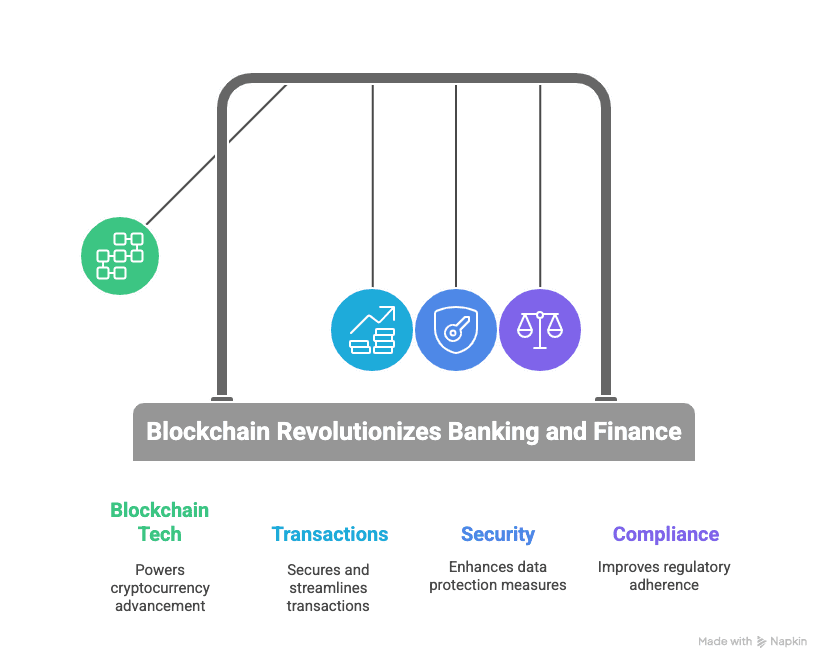Table of Contents
- Introduction
- Blockchain in Banking and Finance: The Larger Picture
- Best Blockchain Course in India: Making the Right Choice
- Blockchain Certification for Finance Professionals: The Competitive Advantage
- Digital Banking and Blockchain: The Match Made in Heaven
- Fintech and Blockchain Training Program: Closing the Gap
- Key Takeaways
- FAQs
- Conclusion
Introduction
If you’ve ever thought that blockchain was only for crypto obsessive or Bitcoin investors, it’s time to train your thoughts, because the technology that powered this new week’s cryptocurrency advancement is now taking phenomenal strides to revolutionise the entire banking/finance sector – quietly, but powerfully. Blockchain is now a part of most aspects of what a modern bank does – from transactions, to security, to contingency plans, and compliance, it will continue to lay an increasingly embedded foundation for the banking industry.

If you’ve thought that understanding blockchain is optional and wouldn’t affect your future career in banking/finance, you may need to rethink that. A Blockchain course is quickly turning into a must-have for everyone looking to secure or create a future-proof career in banking and finance.
Blockchain in Banking and Finance: The Bigger Picture
Banking and finance is being fundamentally changed at almost an exponential rate by blockchain technology. At its simplest definition, blockchain is a method of secure, decentralized digital ledger that publicly records transactions. However, blockchain has many more potential uses beyond cryptocurrencies such as Bitcoin or Ethereum.
In banking, blockchain has the ability to settle transactions in real time, prevent fraud, aiding compliance, and offering better operational efficiencies sake. Among Indian and global bank there are already many pilots of blockchain solutions for payments, trade finance, and security of data.
Main Applications of Blockchain in Banking and Finance
| Application Area | How Blockchain Adds Value |
| Payments & Settlements | Faster, real-time cross-border transactions |
| Trade Finance | Transparent, tamper-proof documentation |
| KYC & Compliance | Shared, secure digital identities |
| Fraud Prevention | Immutable transaction records |
| Smart Contracts | Automated, self-executing agreements |
The growth of blockchain in finance and banking has already created a huge demand for professionals well-versed in blockchain knowledge.
Best Blockchain Course in India: Selecting the Optimal Direction
The Indian financial sector is implementing blockchain fast, with top lenders such as SBI, ICICI Bank, and HDFC testing its use cases. But bookish knowledge is not going to suffice. In order to effectively leverage the opportunities, professionals must have industry-specific, structured learning.
A Banking and Finance Blockchain course offers real-world skills, use-case-oriented learning, and globally accepted credentials. But how do you choose the best blockchain course in India when choices are many?
Here are key things to look at:
- Industry-Relevant Curriculum with financial services use cases
- Faculty with practical experience in banking and blockchain projects
- Hands-On Learning through simulations, case studies, and live projects
- Certification Recognition by employers and industry bodies
- Placement Support or career guidance to utilize your talents
For Indian finance experts, the appropriate blockchain course is more than a certification—it’s a career catalyst.
Blockchain Certification for Finance Professionals: The Competitive Advantage
With a competitive banking industry, acquiring a blockchain certification for finance professionals can make all the difference. Recruiters now want individuals who know how blockchain operates within regulatory environments, risk management, and financial operations.
Finance-focused blockchain certifications show you can:
- Understand blockchain protocols and infrastructure
- Use blockchain in trade finance and payment systems
- Handle regulatory and legal uses of blockchain
- Implement financial product smart contracts
- Increase security and transparency in bank transactions
A respected blockchain course dedicated to finance empowers you with exactly these skills, enhancing your cv for positions like:
- Blockchain Analyst – Banking
- Digital Payments Specialist
- Compliance and Risk Analyst
- Trade Finance Operations Manager
- Digital Banking Product Manager
Digital Banking and Blockchain: The Ideal Match
With digital banking the new norm in India, the integration of blockchain is the next step. With mobile banking apps, real-time fund transfers, and more, customer demands for speed, security, and transparency are mounting.
Digital banking and blockchain combined make for a strong ecosystem in which transactions are:
- Instantaneous
- Secure and tamper-proof
- Highly transparent
- Cost-effective
Indian banks are already investing in blockchain pilots for remittances, loan processing, and KYC. Those with blockchain knowledge will be leading the development and operation of these digital banking platforms.
How Blockchain Fuels Digital Banking
- Binds transaction processing times from days to minutes
- Makes peer-to-peer payments secure
- Secures mobile banking
- Facilitates customer onboarding using blockchain-based KYC
- Reduces operating expense through process automation
- Optimizes compliance with transparent audit trails
- Prevents fraud with unalterable transaction histories
- Facilitates cross-border remittances at reduced fees
- Enables innovative digital financial products
- Enhances data privacy and protection
A blockchain course developed specifically for digital banking gets you prepared for these leading-edge jobs.
Fintech and Blockchain Training Program: Bridging the Gap
The convergence of blockchain and fintech is where banking’s future is located. India is experiencing a boom of fintech companies disrupting lending, payments, wealth management, and beyond—using blockchain as an enabler.
A well-structured fintech and blockchain training program assists finance professionals in filling the knowledge gap. It allows them to:
- Understand blockchain’s application in digital wallets and payments
- Learn about decentralised finance (DeFi) platforms
- Discover blockchain-based credit and lending models
- Analyze actual blockchain fintech success stories
- Utilize blockchain in regulatory technology (RegTech)
Regardless of whether you’re targeting a fintech startup or innovation team in a bank, taking a blockchain course with a fintech emphasis is priceless.
Table: Fintech Innovations Driven by Blockchain
| Fintech Area | Blockchain Impact |
| Digital Payments | Secure, real-time peer-to-peer transactions |
| Lending & Credit | Blockchain-based credit scoring and smart contracts |
| Wealth Management | Tokenised assets and transparent trading |
| RegTech | Automated compliance using blockchain records |
| Insurance | Smart contracts for faster claims processing |
Looking to future-proof your banking career? Check out the Post Graduate Program in Banking and Finance by Imarticus Learning—curated to meet today’s digital banking and blockchain requirements.
Takeaways
- Blockchain is transforming banking and finance, way beyond cryptocurrencies.
- A blockchain course is the need of the hour for finance professionals to remain competitive.
- The best blockchain course in India provides industry-focused practical learning.
- Blockchain certification for finance professionals gives a competitive advantage.
- Blockchain and digital banking are powering next-generation banking innovation.
- Blockchain and fintech training programs will be essential to ride out future disruptions.
FAQs
1. Is blockchain useful for anything apart from cryptocurrency?
Yes absolutely, blockchain has use cases in banking that deal with processes other than cryptocurrencies like Bitcoin, namely payments, compliance and more.
2. How does blockchain enhance security in banking?
Once a transaction is recorded on the blockchain in a decentralised ledger, it is impossible to go back and change any details at a later date. This significant added security and option reduces cases of fraud.
3. Why should finance professionals take a blockchain course?
Taking a blockchain course provides finance professionals skills that are important when using blockchain to streamline accurate and secure financial processes, making them much more competitive.
4. Which roles will need blockchain knowledge in the banking industry?
Current roles that already have or will soon have a blockchain component include: Blockchain Analyst, Compliance Specialist, Trade Finance Manager and Digital Product Manager to name a few.
5. Is blockchain being used in Indian banks?
Yes, several major Indian banks including State Bank of India (SBI), ICICI and HDFC are testing various blockchain use cases including remittances, trade finance and more.
6. How will blockchain support digital banking?
Blockchain will allow secure transactions to be processed much faster, help KYC processes become more efficient and cheaper, while also enhancing the overall digital banking experience.
7. What is the relationship between fintech and blockchain?
Fintech firms use blockchain in payments that are secure, smart contracts, decentralised finance, and automated compliance.
8. What is the best blockchain course in India?
The best blockchain course in India will combine a finance oriented course, practical learning, real world industry certification, and job support.
9. Can blockchain help in preventing banking fraud?
Yes.. blockchain’s tamper-proof records make it much harder to commit fraud or manipulate transaction data.
10. Is a blockchain certification enough to get a job in banking?
While a certification boosts your profile – combining it with practical skills, financial knowledge, and industry exposure offers the best job prospects.
Conclusion
Blockchain is not the future, it’s the present of contemporary banking. As a vehicle for security and powering innovation in digital banking, its influence cannot be overstated. For students and professionals in finance in India, there is no longer any question of a blockchain course being optional. It is now a necessary part of your learning.
By developing your education based on blockchain, you are getting more than a job, you are becoming future-ready for a profession that is ever-changing in the world of banking and finance.
Begin your journey today—join a blockchain-oriented banking course and drive the change.
External References:
External References:










 On the other hand, if a digital ledger is created through
On the other hand, if a digital ledger is created through 


 If you wonder
If you wonder